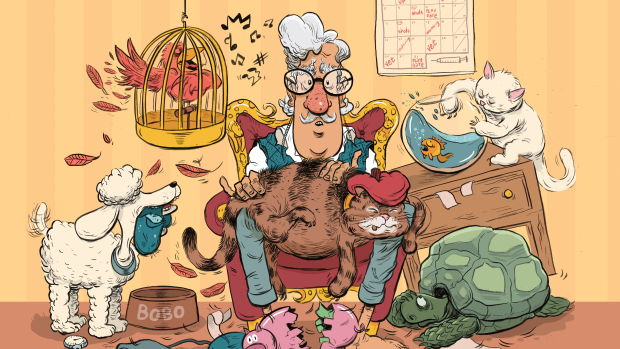Sep 26, 2018
Pets: Your animal companions in retirement
Presented by:


Our animals bring us love and companionship, and studies have shown they may even make us healthier, but there are many considerations before you buy that Persian kitten or golden retriever.
It was love at first sight. Nicole Ewing was looking for a dog to join her in her home in the country and surfed the internet to see if there were any rescue animals available. A trip to see an Olde English Bulldogge looking for a home was brief. She was half parts solid muscle and adorableness and eight-month old Zoe slept in Ewing’s car all the way to her new Ottawa home. There she proceeded to chew everything in sight including baseboards and three TV remotes.
Ewing wouldn’t have it any other way. “She brings out the best in me,” Ewing says.
Pet owners would agree with that. If you are someone in or nearing retirement and are thinking that a pet would be a great companion, medical proof that suggests pets are good for your health backs you up.
A recent University of Missouri study explored the link between older adults and dog walking. It found that owners who were closer to their pet walked their dogs more and as a result had a lower body mass index, fewer doctor visits, and more frequent moderate and vigorous exercise.1 And other studies suggest that pet ownership has positive mental benefits for retirees.2 But people should also be aware that pet ownership also brings costs, time and planning and — if you are putting your pet above other aspects of your lifestyle — that a pet can have a major impact on your retirement.

For instance, pets can get sick. Ewing, Tax and Estate Planner, TD Wealth, when not caring for Zoe says she noticed Zoe limping after a spirited run around the property. She had torn the ligaments in both back legs. Two operations and $2,600 later, she is fine but it is a lesson in what pet owners may have to contend with for the care and comfort of their pets.
As an animal person, Ewing says she will talk about these considerations to clients.
“We talk about the costs associated with a pet. Or we ask, if something happens to you, do you have somebody to come over and care for your pet? Or are you going to be hiring someone to do that for you?” she asks.

- NICOLE EWING, TAX AND ESTATE PLANNER, TD WEALTH
An animal friend whose well-being depends on someone feeding, caring or even purchasing a cute sweater for them, may have a powerful positive influence over the owner. But you don’t need medical studies to convince pet owners that dogs and cats keep them active. For many people who have seen their kids move out or who even have had a spouse pass away, having a pet gives them a routine and keeps them engaged.
Many people find they have a pet in their senior years not by design but because their household has always had one. Others may want to buy a dog or cat or other pet when they begin to transition into retirement. But many considerations should be looked into including whether you are going to be travelling to a winter home, or cottage throughout the summer. If that is the case, a prospective owner should make arrangements for the pet to travel with them, to board it at a kennel, or have it stay with a friend.
Some of these options come with costs and paperwork and aren’t for everyone; Ewing had a bad experience with a kennel and now makes other arrangements for Zoe. If you are transporting a pet across international borders, updated rabies certifications and other documents are needed. Check with the Centre for Disease Control for updated information about travelling with your pet to the U.S., and other countries regulations if you visit.
“We see this problem with our snowbirds. They are leaving for six months and they have to either board their pet for that period of time, and that can be can be quite expensive, or take it on the airplane, whether at your feet on in the hold. This all comes with costs,” Ewing says.

- NICOLE EWING, TAX AND ESTATE PLANNER, TD WEALTH
As well, some pets may be more suited for seniors than others. A couple who have lived with a German shepherd throughout their lives may not be happy with a Pekinese. On the other hand, people should be mindful of needing to control their pet when as they become frailer. Also, some high-strung breeds of dogs may be inappropriate in some situations. You may have allergies that determine only a certain breed of cat or dog is right for you and your pet may have its own allergies that dictate a certain kind of diet.
Many dogs are built for frequent long walks, and if someone can’t give the exercise that’s needed for their dog, perhaps a dog more suitable to the owner’s lifestyle is needed or maybe even a cat.
Ewing says people should keep in mind that purebred cats or dogs may come with genetic health ailments, such as joint abnormalities that do not appear until later in life and which can drive up medical expenses or limit the animal’s lifespan.
According to the Ontario Veterinary Medical Association, the first year of puppy ownership could cost $3,000 while a kitten would be $2,000.4 That includes one-time costs like neutering but be aware that food costs could rise if you are raising a large dog.
Other considerations include the cost for the animal itself. Ewing says the Olde English Bulldogge breed traditionally sell for $2,500 although she got Zoe as a rescue for a fraction of the cost. Other costs may include specialized grooming if needed, vet bills (vaccinations), perhaps obedience training, travel aids like a car restraint or crate, plus incidentals you may not think about such as a new fence to keep the puppy in the yard and perhaps replacement TV remotes.
And if dogs and cats are both out of the question, many people enjoy birds and, depending on your personality and sense of adventure, your pet may come with quills like a hedgehog or a shell like a box turtle (Advantages? A box turtle won’t wear you out like a German shepherd).

Seniors should consider what happens if they simply get the flu or if the weather is poor for two weeks and can’t get the dog out of the house, what is your support? This also goes for the pet’s age as well; someone who is in their 80s may not wish to deal with the antics of a kitten or the illnesses associated with an elderly animal.
Seniors also have to think about their living accommodations, both now and in the future. Condos and rental apartments may have their own rules around pets and pets may also be severely restricted in seniors’ care residences.
Ewing reminds everyone to think carefully when taking on a pet in retirement and ensure you and your home is prepared. Like any other expense, if you are on a budget or a fixed income, and if your new pet is going to eat into your savings, it would be wise to make a money plan just like you would for any other financial goal. And if finances are an issue, she says people can talk to their financial advisor to make things work. She says she sees firsthand the comfort and companionship pets bring to her older clients.
“It gets them out of the house, they go for walks and they can continue to be social with other dogs and owners. I see that in our own neighbourhood, sometimes the only time you see your neighbours is when you are out walking the dog.”









